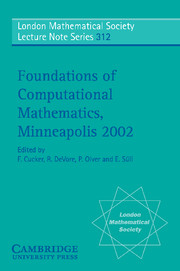8 - Maple Packages and Java Applets
Published online by Cambridge University Press: 05 November 2011
Summary
Abstract
In this note I shall briefly describe an on-going project at Utah State University to create Maple software and Java applets for use in classification problems in geometry and algebra. The first problem we are currently working on deals with Petrov's remarkable classification of all 4-dimensional local group actions which admit a Lorentz invariant metric; the second focuses on the classification of low dimensional Lie algebras. The software which supports our work on these two classification problems is part of the Maple suite of software packages called Vessiot, an integrated collection of Maple programs for computations in differential geometry, Lie algebras and the variational calculus on jet spaces.
Introduction
A central theme in mathematics is the classification of mathematical objects up to a prescribed notion of equivalence. Well-known examples of such classification problems include the classification of two dimensional surfaces up to homeomorphism, the classification of Abelian groups up to isomorphism, and the classification of vector field systems in the plane up to local diffeomorphism.
From a strictly mathematical viewpoint, a classification problem may be considered solved once a complete list of inequivalent representatives of the mathematical objects under classification is obtained. However, from a practical perspective, a number of important issues remain.
How does one locate a given mathematical object in the list of representatives furnished by the solution of the classification problem? This problem is especially acute if one wants to use the results of a classification problem but one is not an expert in the area. […]
- Type
- Chapter
- Information
- Foundations of Computational Mathematics, Minneapolis 2002 , pp. 193 - 206Publisher: Cambridge University PressPrint publication year: 2004
- 1
- Cited by

